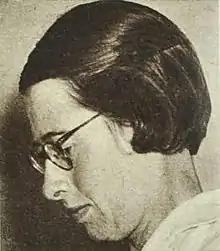Mavis Freeman | |
|---|---|
 Freeman in 1940 | |
| Born | Mavis Louisa Freeman 30 January 1907 Ballarat, Victoria, Australia |
| Died | 1992 (aged 84–85) Malvern, Victoria, Australia |
| Alma mater | University of Melbourne |
| Awards | Victorian Women Graduates' Association Travelling Fellowship, 1934 |
| Scientific career | |
| Institutions | Walter and Eliza Hall Institute Second Australian Military Hospital, Palestine |
Mavis Louisa Freeman (30 January 1907 – 1992) was an Australian bacteriologist and biochemist. She assisted Macfarlane Burnet in identifying the source of Q fever.
Early life and education
Mavis Louisa Freeman was born in Ballarat, Victoria on 30 January 1907 to Louisa (née Lutzen) and Harry Stanley Freeman.[1] She completed her primary education at Esperance Girls' School, Brighton where she was dux of classes III and IV.[2][3] She then attended Firbank Girls' Grammar School where she was dux of the school in 1924.[4] On leaving school she won a scholarship to Trinity College[5] at the University of Melbourne from which she graduated with a BSc in 1928.[6]
Career
Freeman's first job was at the Walter and Eliza Hall Institute where she was employed as a research fellow. Her work included studying snake venoms with Charles Kellaway and proteins with biochemist H. F. Holden.[7]
In 1934 she won the Victorian Women Graduates' Association Travelling Scholarship and went to London to continue her studies at the Lister Institute.[8] She returned to the Walter and Eliza Hall Institute and, in 1939, assisted Macfarlane Burnet in the discovery of the source of Q fever.[9]
In World War II she was appointed as pathologist to the Second Australian Hospital, A.I.F. in Palestine and was the only woman to serve overseas, other than nurses and masseuses.[10][11]
Freeman returned to the Walter and Eliza Hall Institute after the war but resigned in 1948 and moved to Adelaide to work at the Institute of Medical and Veterinary Research.[12] She completed an MSc at the University of Melbourne in 1950.[13][14]
References
- 1 2 "Death certificate: Mavis Louisa Freeman". Briths Deaths and Marriages Victoria. Retrieved 1 October 2022.
- ↑ "School Speech Days". The Argus (Melbourne). No. 21, 967. Victoria, Australia. 22 December 1916. p. 5. Retrieved 2 October 2022 – via National Library of Australia.
- ↑ "Esperance Girls' School". Brighton Southern Cross. Victoria, Australia. 5 January 1918. p. 5. Retrieved 2 October 2022 – via National Library of Australia.
- ↑ "Firbank Grammar School". The Argus (Melbourne). No. 24, 447. Victoria, Australia. 13 December 1924. p. 19. Retrieved 2 October 2022 – via National Library of Australia.
- ↑ "Trinity College". The Age. No. 21, 741. Victoria, Australia. 6 December 1924. p. 23. Retrieved 2 October 2022 – via National Library of Australia.
- ↑ "The University". The Age. No. 22, 790. Victoria, Australia. 23 April 1928. p. 10. Retrieved 2 October 2022 – via National Library of Australia.
- ↑ "Fellowship Awarded". The Age. No. 24, 631. Victoria, Australia. 23 March 1934. p. 7. Retrieved 2 October 2022 – via National Library of Australia.
- ↑ "Women in the world", The Australian Woman's Mirror, The Bulletin Newspaper, 10 (21), 17 April 1934, retrieved 2 October 2022
- ↑ "Q Disease's Days are Numbered: 'G-Men' Hard On Trail". The Herald. No. 19, 260. Victoria, Australia. 8 February 1939. p. 8. Retrieved 2 October 2022 – via National Library of Australia.
- ↑ "Girl Scientist to Serve Oversea With 2nd A.I.F." The Herald. No. 19, 578. Victoria, Australia. 14 February 1940. p. 4. Retrieved 2 October 2022 – via National Library of Australia.
- ↑ "Let's Talk of Interesting People". The Australian Women's Weekly. Vol. 8, no. 16. Australia. 21 September 1940. p. 2. Retrieved 2 October 2022 – via National Library of Australia.
- ↑ "Freeman, Mavis Louisa". The Australian Women's Register. Retrieved 1 October 2022.
- ↑ Freeman, Mavis (1950), Work submitted for the degree of Master of Science, retrieved 2 October 2022
- ↑ "Record Sept. Roll At Graduation Today". The Herald. No. 22, 865. Victoria, Australia. 4 September 1950. p. 9. Retrieved 2 October 2022 – via National Library of Australia.